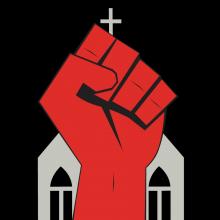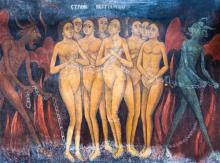Christianity

Religious historians say that every 500 years, Christianity goes through a “massive transition,” as noted religion writer Phyllis Tickle puts it.
Around 500 A.D., “barbarians” sought to subjugate Rome by wiping out its underlying religion. Christianity went underground. In abbeys like Iona, monks painstakingly copied Scripture and civilization’s great writings, in effect saving Western civilization itself.
Around 1000 A.D. came the “Great Schism,” when the Western church based in Rome and the Eastern church based in Constantinople fought over creeds and doctrine, political power and cultural hegemony. That split endures to this day between Eastern Orthodoxy and Catholicism.
Around 1500 A.D. came the Protestant Reformation, when nationalism born of exploration in the New World and new commercial wealth demanded an end to Rome’s domination of European life. That split, too, endures.
Now comes a new millennium, and Christianity wears so many different faces that it’s difficult to speak of a single “Christian movement.”

Sunday afternoon, March 28, 1982. If you were an evangelical Christian living in Guatemala, watching TV, your heart would have been beating faster and tears of joy may have flowed down your cheeks.
A man was speaking so thoughtfully, with the Bible in hand. He was teaching the audience, “If there is no peace within the family, there would be no peace in the world. If we want peace, we need at first to be at peace in our hearts.” He went on, “Guatemala is the chosen people of the New Testament.”
That 55-year-old man was Guatemalan General Efrain Rios Montt, pastor of the Iglesia Verbo (Church of the Word), who had recently become president of Guatemala through a military coup.
On May 10, 2013, a Guatemalan court sentenced Rios Montt to 80 years in prison after finding him responsible for deliberate killings by the armed forces of at least 1,771 members of the Maya Ixil population during his 1982-83 rule.

Seen on a rural hillside: “Under Construction.”
Someone had added, in letters almost as large, “No equipment, no budget, no crew and no work, but we have the sign.”
For the vast majority of Christians, this sign sums up their philosophy of discipleship.
In their determination to not be ‘saved by works’ they have cultivated a historically isolated, theologically sterile, spiritually impotent ‘faith’ that I can only describe as ‘Christian inertia.'
In this cultivated obliviousness they have forgotten, perhaps deliberately, that we are “created to do good works in Christ” (Ephesians 2:10).
They have somehow come to believe that ‘being a Christian’ is all about having the sign; being transformed (Romans 12:2) by the living word of God, far from being a thriving daily reality, has become an abstraction reduced to a bumper sticker or slogan.

A while back I had an opportunity to sit down and talk with up-and-coming singer-songwriter Nataly Dawn about faith and songwriting. Dawn grew up in France, went to Stanford for undergrad, and made it big on YouTube with a duo called Pomplamoose before signing with Nonesuch records and starting her solo work.
This interview was edited for length and content.
Nataly: I have to warn you, I’m in a little bit of a food coma; I just made a really big brunch. I had probably five pancakes.
Brandon: Wow. Impressive. That’s awesome.
Just because the nation may change its laws to “tolerate legalized acts of immorality” does not make those acts any less spiritually damaging, senior Mormon apostle Boyd K. Packer said on Saturday at the Church of Jesus Christ of Latter-day Saints’ 183rd Annual General Conference.
“The permissiveness afforded by the weakening of the laws of the land to tolerate legalized acts of immorality,” Packer said, “does not reduce the serious spiritual consequences that result from the violation of God’s law of chastity.”
Packer, president of the Mormons’ Quorum of Twelve Apostles and next in line to take over the church’s reins, didn’t specifically mention gay marriage, but his comments came amid controversy on the issue nationwide and a significant swing in public and political opinion toward favoring such same-sex unions.

I’m no postmodern theology expert, so I’ll leave it to the pros to explicate more about what’s what in postmodern thought. But for me, the exciting work revolves around supplanting things like binary, propositional “truths” about God with more inductive, open-ended notions of the Divine that transcend religious doctrine or even our own mental constructs of God. This is both a necessary and a liberating process, I think, that indeed can lead the Church (big C Church, that is) toward something far more reconciling and healing for humanity than the modernist approach to faith we’ve employed for many decades now, if not some centuries.
It’s helpful to look back a little bit at where we’ve come from in our religious and theological evolution of thought and practice. At the risk of geeking out on something that puts everyone to sleep, I’ll try to make this quick and fairly painless. Interestingly, it can be argued that the more fundamentalist strain of Christianity can trace its origins back to the “liberal” thinking following the Enlightenment that suggested all things – faith, God, and religious thought included – could be explained by rational means. This hyper-rationalism sought to build up rhetorical constructs that made a case for God, so to speak, as well as buttressing the doctrines of the Church.

Labels can be helpful when, for instance, applied to cans of soup or barrels of toxic waste. But they are less so when affixed to human beings – particularly when labels are meant to summarize, indelibly, one’s spiritual identity.
In a recent Rolling Stone interview, Marcus Mumford, the 26-year-old lead singer of the wildly successful British band Mumford & Sons, raised the hackles of religious folks (in some quarters) when he declined to claim the “Christian” label as his own.
You see, Marcus is the son of John and Eleanor Mumford, who are the national leaders of the Vineyard Church in the U.K. and Ireland, an arm of the international evangelical Christian Vineyard Movement. Last year, he married actress Carey Mulligan, whom he’d met years earlier at a Christian youth camp.
And the music of Mumford & Sons, for which Mumford is the main lyricist, is laden with the themes and imagery of faith – often drawing specifically upon the Christian tradition. They explore relationships with God and others; fears and doubts; sin, redemption, and most of all, grace.

Nuanced or not, are Christians, especially evangelicals, perceived as being against things like peacemaking? Or is it that their version of peacemaking is backward looking toward some halcyon day of yore (or 1950s America)? At this point in the book, Rob spends a lot of time walking us through the development of justice in the Bible from “eye-for-an-eye” to “turn the other cheek.” I want you to read this chapter for yourself and make your own conclusions about what Rob sees and tell me if you see it, too.
Rob's thinking is that people are gradually cluing in to God's vision of a world without retributive violence. “Revenge always escalates,” he writes. Always.

A caller into a Christian radio station was telling the hosts about some of the strains in her marriage. Soon, she was talking about the physical abuse she was receiving from her husband.
And the response of the hosts of this Christian radio show? “What are you doing that is making him so mad?”
There’s a sad history in too many Christian churches of pastors telling abused wives that their duty is, as one author noted, “to trust that God would honor her action by either stopping the abuse or giving her the strength to endure it.”
I don’t think that view is as common in churches as it once was. And in many churches pastors and other faith leaders will act thoughtfully and quickly to come to the aid of a victim of abuse. But the undercurrent of tolerating abuse lingers.
A renowned theology professor from the Southern Baptist Theological Seminary, Bruce Ware, preached a few years ago that when women refuse to submit to their husbands, men will sometimes respond with abuse. He did not condone that, but he seemed to accept it as inevitable.

It's the Monday after Easter, and I couldn't think of a better day to talk about God being with us. Adam Ericksen wrote about the dance of doubt and faith on Good Friday, the challenge and beauty of embracing the fullness of the journey. Rob takes that all one step further in this chapter: With.
There is, I believe, another way to see God, a way in which we see God with us— with us, right here, right now. This isn’t just an idea to me; this is an urgent, passionate, ecstatic invitation to wake up, to see the world as it truly is.
(Kindle Locations 1201-1203)
Suddenly I have “Right Here, Right Now” by Jesus Jones playing in my head. Excuse me for being a child of the 80s.
My take-away? This God doesn't choose sides like we do.
(The Controversial figure Rob Bell has created another firestorm with his latest provocative book What We Talk About When We Talk About God. Raven Board Member Tripp Hudgins and I will share our thoughts on the book in this blogalogue. We invite you to join the discussion by leaving a comment below.)
Thank you, Tripp Hudgins, for your “Open Letter to Rob Bell.” As always, you are inspirational and thought provoking. The letter provides a great introduction to our blogalogue on Rob’s latest book What We Talk About When We Talk About God. I want to emphasize one point you make and relate it to the first chapter of the book, called “Hum.”
You claim that, “This book is not about a ‘new’ thing. It’s simply about God and how we come to know God in this world.” This is such a great point because Rob isn’t making up new ways to talk about God. Throughout the book, Rob explores what God has done in the past and how God continues to pull all humans into a global future that has “greater and greater peace, love, justice, connection, honesty, compassion, and joy” (19).

The commons was the name for the public space shared by all in New England towns. It is the root of commonwealth, a nice term for an entire civic entity, like a state, in which every citizen is viewed as a stake-holder. Its values are the opposite of those decried in the lament “private wealth and public squalor.” The commons are the opposite of gated communities.
Today, there are two crises of the commons — one on the right and one on the left. One is indifference to the commons, even starving the commons. This means the demise of “social capital” (the sum total of all social networks and human investments in a community or polity) and civic values shared by all, and their surrender to utilitarian individualism and the dominance of the market. The other is the argument over what discourse style is appropriate to the commons — what language should be spoken and what subjects allowed in public life. Hint: lucid rationality is in, religion is out.

I love St. Patrick’s Day.
The one day of the year when, for better or worse, Western culture allows me to claim my non-existent inner Irishman.
Kiss me, baby.
Okay. I’m done.
There are many stories and legends about the fascinating life of St. Patrick. One of the most famous legends recounts how this great 5th century saint banished all of the snakes from Ireland. Bad snakes. Bad.
My work at the Raven Foundation during the last few years has taught me to be suspicious of such legends. In fact, we might call them myths. Myths cover up scapegoating of human beings by telling the story in a more innocuous way. So, instead of saying we banish humans, we say we banished snakes.
Interestingly, the last glacial period (some 10,000-100,000 years ago, depending on whom you ask) beat St. Patrick to the snake banishing. But, Christian tradition has given Patrick all the credit. So, if there weren’t snakes around during Patrick’s day, what’s with the legend?

I used to lead and organize inner-city mission trips. Churches, youth groups, non-profit organizations, and well-intentioned philanthropists would excitedly arrive within the diverse and fast-paced world of Chicago and enthusiastically dive into whatever tasks we gave them. The work they volunteered for made a huge difference in people’s lives, but more importantly, it dramatically challenged — and changed — their own way of thinking about urban ministry.
For years “The City” has been the pet project of Christians throughout America. Billions of mission trips have been made to homeless shelters, food pantries, and poor neighborhoods, all in an effort to “clean up,” “rehabilitate” and “evangelize” in Christ’s name. Unfortunately, the inner-city isn’t as stereotypical as we want it to be, and our missionary zeal can often cause more harm than good.
Here is the most common myth that Christians mistakenly apply to urban areas: The Inner-City is Morally Bankrupt.
OUR LIFE TOGETHER can be better. Ours is a shallow and selfish age, and we are in need of conversion—from looking out just for ourselves to also looking out for one another. It's time to hear and heed a call to a different way of life, to reclaim a very old idea called the common good. Jesus issued that call and announced the kingdom of God—a new order of living in sharp contrast to all the political and religious kingdoms of the world. That better way of life was meant to benefit not only his followers but everybody else too. And that is the point of it.
Christianity is not a religion that gives some people a ticket to heaven and makes them judgmental of all others. Rather, it's a call to a relationship that changes all our other relationships. Jesus told us a new relationship with God also brings us into a new relationship with our neighbor, especially with the most vulnerable of this world, and even with our enemies. But we don't always hear that from the churches. This call to love our neighbor is the foundation for reestablishing and reclaiming the common good, which has fallen into cultural and political—and even religious—neglect.
Judaism, of course, agrees that our relationship with God is supposed to change all our other relationships, and Jesus' recitation of the law's great commandments to love God and your neighbor flows right out of the books of Deuteronomy and Leviticus (see Deuteronomy 6:5; Leviticus 19:18). Islam also connects the love of Allah with love and responsibility to our neighbors. In fact, virtually all the world's major religions say that you cannot separate your love for God from your love for your neighbor, your brothers and sisters. Even the nonreligious will affirm the idea of "the Golden Rule": "Do to others as you would have them do to you" (Luke 6:31).

Last Friday was International Women’s Day. It was a day of celebrating how far we’ve come, but also a reminder of how far we need to go.
I’m reminded of an experience I had with a member of my youth group a few years ago. We were volunteering for a social service project. A member of the group happened to be named Eve and we thought it was fun to play up the joke. I’d start greeting people, “Hi! I’m Adam,” and then Eve would chime in, “and I’m Eve!”
We always received the strangest looks, which, of course, is why we did it. But this time it was different. A man at the service project actually said,
“Oh. So you’re the one to blame.”
Eve was able to laugh it off and respond with grace, but I was pissed. I instinctively scowled at the man. It was a deep blow to me because, once again, religion was being used to put women down. But this time it was personal. Religion was being used to put down a member of my youth group.
Of course, religion hasn’t always been good to women. Or, maybe it would be better to say that religious men have used religion as a weapon to make women feel inferior. Whenever we blame someone else it’s a sign of our own weakness and insecurities. We don’t have the courage to deal with our own inner turmoil so we blame someone else. This is classic scapegoating and we men have been scapegoating women in this way since the beginning of human history. It’s pathetic. International Women’s Day is a reminder to me that women and men need to work together to end the religious bigotry against women.
My model for this is Jesus, my favorite feminist. [1]
So, in the spirit of International Women’s Day, I offer you the top 4 ways Jesus included women as full members of his posse.

I read a lot of Trinitarian theology last semester at Duke Divinity school, most of it trying to discern how believing in a Triune God might affect the way people of different religious faiths relate to one another. The other great Monotheisms, Islam and Judaism, of course reject the Trinity as they reject Jesus as divine. But what if the Christian belief in the Triune God is the very basis on which Christians can accept Jews as Jews, Muslims as Muslims, and atheists as atheists? Different theologians have explored how the Trinity might be a good place to ground a Christian theory of religious pluralism. S. Mark Heim has gone so far as to say that God’s own inner diversity shows God’s intention for a diverse humanity, even including religious diversity. In other words: People might believe in a non-Trinitarian God because they were made by a Trinitarian God. Mind-blowing.
I wasn’t expecting to find resonance in Charles Darwin, whose name has been used in so much anti-religious fervor. But in his 1857 letter to Asa Gray, Darwin wrote about the “principle of divergence” and how “the same spot will support more life if occupied by very diverse forms.” We might not want to make a precise analogy to human society when Darwin concludes that “each new variety or species, when formed will generally take the place of and so exterminate its less well-fitted parent.”
That line of thinking could easily lead us to euthanasia. But, taken with his observation that diversity fosters life, we might say that co-existence with others forces a species to adapt, and everyone is better for it. Consider the converse of Darwin’s statement: The same spot will support less life if occupied by a unitary form. There is something life-giving – Heim might say “divine” – about difference.

On the road, listening to NPR's Terry Gross interview Lawrence Wright, author of Going Clear: Scientology, Hollywood and the Prison of Belief, and having recently spent two hours at the United States Holocaust Memorial Museum seeing the Nazis photographed, not in the usual black and white, but in the full colors of the natural world, it occurred that the human impulse to be part of an exclusive group has deep, powerful roots in religion.
People join "true churches" for this same impulse, a motivation that could not be further from the intention of the Gospel, which, at the heart of its mission, contains the abolition of exclusivity of any kind.
Christ following is not about joining the best club, but about following where Christ leads, straight into the company of every person, no matter their situation or circumstances, in order to be a servant to them, one who lays down his or her life, like Jesus, for the life of the world.
We were made for Communion with God and our neighbor, who Jesus tells us is every person.
Scientology, National Socialism, and other cults, past or present, religious or tribal, are modern forms of Gnosticism. They say, in varying ways, "We have something (usually 'knowledge') not publicly available to everyone and you must join us, submit to us, to participate in our secret." It's important to recognize that this is also an offer of power.

Yesterday, I discussed some of the historical bases for our contemporary understanding of Satan. Today, I’ll consider how hell evolved as part of the Christian faith.
In Old Testament scripture, the resting place for the dead is called Sheol. While some believe this is the same as hell, there are indications to the contrary. In the ancient Jewish tradition, Sheol is a place of rest for both righteous and wicked, with no distinction.
Not everyone is happy about it either.
In the third chapter of Malachi, the prophet recognizes the consternation of faithful Jews who are frustrated that the wicked share the same fate. In Ecclesiastes, the priest Koheleth claims that serving God is vanity. For him, the fact that the righteous are treated the same as the wicked and vice-versa should be a call to eat, drink and be merry.
With respect to any relationship between Satan in the Old Testament and Sheol, there is none.
